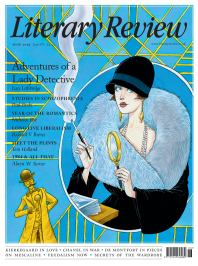Frank Mclynn
What’s the Big Idea?
Out of Our Minds: What We Think and How We Came to Think It
By Felipe Fernández-Armesto
Oneworld 464pp £25
The title and introduction of Felipe Fernández-Armesto’s book led me to expect something like Bertrand Russell’s 1948 tract Human Knowledge, a quasi-Kantian investigation of how we have come to know what we know. This is not what we get. Perhaps a more appropriate comparison would be with the philosopher-earl’s History of Western Philosophy. But whereas that book was the product of a philosopher looking at history, this one is more the work of a historian looking at philosophy. That, however, is to simplify, for Fernández-Armesto’s immensely learned and ambitious book, which is essentially a survey of human history as shaped by our imaginative and intellectual leaps, encompasses not only philosophy but also technology, biology, palaeontology, robotics, physics and, indeed, the entire panoply of human experience.
The usual suspects pass by in parade: cavemen and Neanderthals, the Ice Age, the coming of agriculture, the rise of the state and full-time officials, the general ‘crisis’ (Fernández-Armesto notes the term is contested) of the late second millennium BC and the explosion of knowledge in the mid-first millennium BC, with Socrates, Buddha, the Upanishads, Zoroaster, Zeno, Parmenides and, above all, Plato and Aristotle making their mark in roughly the same three-hundred-year period. Then from Roman times onwards the path is also very familiar: the so-called Dark Ages and the Renaissance (both of which terms Fernández-Armesto deprecates), the Enlightenment, Romanticism, the collapse of religious belief and the general crisis of humanity in the 20th century.
As befits a believer in the Trinity, it seems there are three different Fernández-Armestos. The first is the brilliant historian of exploration; the second is the massively erudite exponent of ‘big history’ in works such as Civilizations; the third, and the problematical one for me, is the conservative Catholic thinker.
Parts

Sign Up to our newsletter
Receive free articles, highlights from the archive, news, details of prizes, and much more.@Lit_Review
Follow Literary Review on Twitter
Twitter Feed
How to ruin a film - a short guide by @TWHodgkinson:
Thomas W Hodgkinson - There Was No Sorcerer
Thomas W Hodgkinson: There Was No Sorcerer - Box Office Poison: Hollywood’s Story in a Century of Flops by Tim Robey
literaryreview.co.uk
How to ruin a film - a short guide by @TWHodgkinson:
Thomas W Hodgkinson - There Was No Sorcerer
Thomas W Hodgkinson: There Was No Sorcerer - Box Office Poison: Hollywood’s Story in a Century of Flops by Tim Robey
literaryreview.co.uk
Give the gift that lasts all year with a subscription to Literary Review. Save up to 35% on the cover price when you visit us at https://literaryreview.co.uk/subscribe and enter the code 'XMAS24'